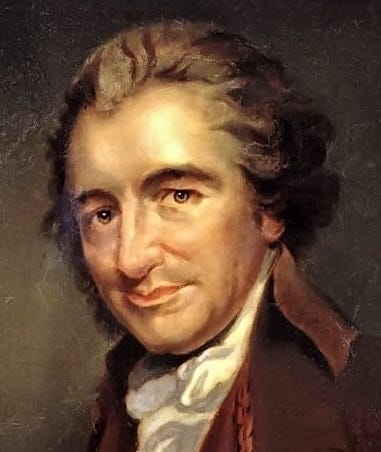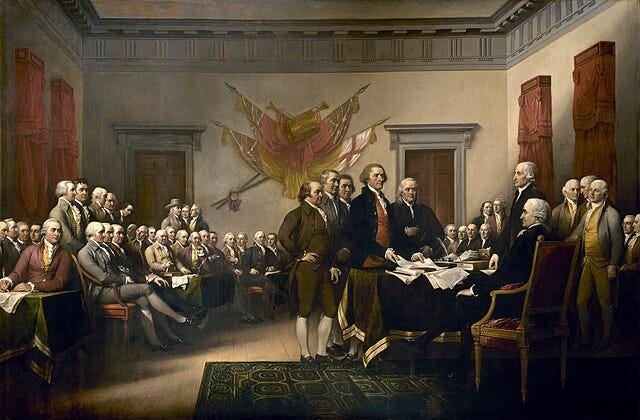Before the Fourth of July, there was Common Sense. The Revolutionary War began at Lexington and Concord in April 1775. The fighting continued with the battle at Bunker Hill that summer, but few Americans had any idea of breaking with the mother country.
In July 1775, Congressional delegates sent what was known as the “Olive Branch Petition” to London. They told of their “tender regard” for the British kingdom. They pledged that Congress would “use all the means in our power . . . for stopping the further effusion of blood.” It was said that in the colonies, it was “unsafe for a man to espouse independence in any public company.”
But in January 1776, a pamphlet began to be sold at print shops and bookstores up and down the colonies. Common Sense argued that independence was not just desirable, it was imperative. “The blood of the slain, the weeping voice of nature cries, ’Tis time to part.” It was published anonymously, its writer identified only as “An Englishman.”
It quickly became the fastest selling and most widely read publication in American history. It was copied by newspapers, pirated by other printers, read aloud in taverns and town squares. Its impact was immediate and profound. “Sometime past the idea [of independence] would have struck me with horror," a letter-writer to the Pennsylvania Evening Post admitted in February. “I now see no alternative. Can any virtuous and brave American hesitate one moment in the choice?”
Americans suddenly became wild for independence. Why? Common Sense had, in plain language, shattered an icon that had dominated the world for centuries. The author asserted not just that we should break with Britain, but that the whole idea of monarchy and hereditary aristocracy was a fraud.
The notion that one man had a “divine right” to rule was a fiction. George III was a “royal brute” put on the throne by “armed banditti.” No longer should power be gripped by the most violent, the richest, the most unscrupulous. No longer should offices and titles be passed down a bloodline. “As in absolute governments the King is law,” the author wrote, “so in free countries the law ought to be King.”
He recommended “an open and determined declaration of independence.” By June independence was being demanded in Congress. In July the declaration became a reality. We’re still celebrating.
It quickly became known that the author of Common Sense was Thomas Paine. A working-class immigrant, he had come over from England in 1774 at the age of thirty-seven. He sought a new start, shared what would come to be known as the American Dream. Although he had only a meager education, he had honed his skills by participating in raucous tavern debates in England.
He landed a job as a magazine editor in Philadelphia and found he had a gift for words. “No writer,” Thomas Jefferson later declared, “has exceeded Paine in ease and familiarity of style and in simple and unassuming language.” Jefferson would distill Paine’s ideas into one of our founding documents. Some truths, he wrote, are self-evident. They need no proof. The first of these: All men are created equal. The Declaration of Independence so closely echoed the language of Common Sense that some believed Paine had written it.
In 1776, the Old World was ruled almost entirely by monarchs and aristocrats. They imposed their will by decree and enforced it by violence. While Paine was writing Common Sense, King George was scribbling in a private letter: “Blows must decide whether they are to be subject to this country or independent.” He was marshaling the largest expeditionary force in his nation’s history to put down the colonial rebellion.
Paine understood that history had come to a turning point. America, he thought, had a chance to be a model for a new direction. The country was already an “asylum for the persecuted lovers of civil and religious liberty from every part of Europe.” Now, by standing up to one of the most powerful monarchs in the world, “We have it in our power to begin the world over again.”
My next book is about Thomas Paine, his influence on the Revolution and on all of American history. He has never been regarded with the same reverence as Washington or Jefferson, but he deserves to be considered among our foremost founders. His ideas are more relevant today than ever.
Each year, commentators try to emphasize the true meaning of Independence Day, to go beyond the hot dogs and the fireworks. Perhaps this year, facing a consequential election, we can take a moment to reflect on how important the founding ideas really were. How new. All created equal. All with unalienable rights.
Thomas Paine put it succinctly: “The birthday of a new world is at hand.”
Please comment and share this post. Order a signed copy of God Save Benedict Arnold HERE. Have a glorious Fourth of July!








I love how much history you know and are so willing to share. Another good read and I look forward to your book about Thomas Paine too!! Happy 4th!!
Of course, another terrific post, with the added bonus of revealing the very good news that you're working on a book about him.